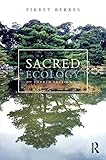Sacred ecology Fikret Berkes
Tipo de material: Libro
impreso(a)
Idioma: Inglés Detalles de publicación: New York, New York, United States Routledge Taylor & Francis Group c2018Edición: Fourth editionDescripción: xxiv, 368 páginas fotografías, ilustraciones, retratos 23 centímetrosISBN:
Libro
impreso(a)
Idioma: Inglés Detalles de publicación: New York, New York, United States Routledge Taylor & Francis Group c2018Edición: Fourth editionDescripción: xxiv, 368 páginas fotografías, ilustraciones, retratos 23 centímetrosISBN: - 1138071498
- 9781138071490
- 304.2 B47 2018
Incluye bibliografía: páginas 299-337 e índice: páginas 359-368
Sacred Ecology examines bodies of knowledge held by indigenous and other rural peoples around the world, and asks how we can learn from this knowledge and ways of knowing. Berkes explores the importance of local and indigenous knowledge as a complement to scientific ecology, and its cultural and political significance for indigenous groups themselves. With updates of relevant links for further learning and over 180 new references, the fourth edition gives increased voice to indigenous authors, and reflects the remarkable increase in published local observations of climate change. Inglés


